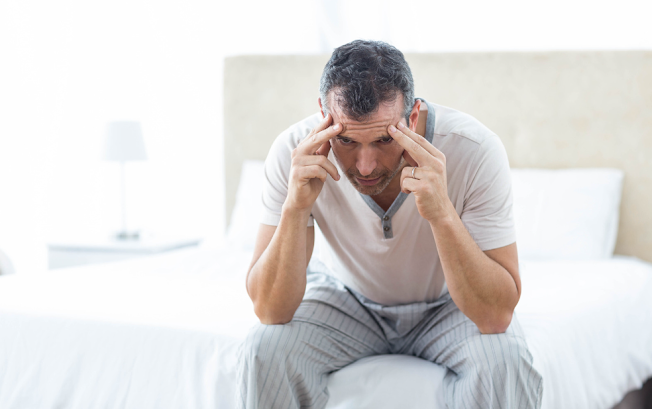What is Finasteride, is it safe, and what are the negative side-effects? Here's everything you need to know about the male baldness treatment pill.
Hair loss in men is rife, with over two thirds expected to experience some form of thinning hair by the age of 40. What's more, hair loss seems to be occurring more often in young men, and with no cure for male pattern baldness (androgenic alopecia), it's not about to go away any time soon.
Despite there being no cure for hair loss, it's not all doom and gloom, because there are some ways that it can be treated, to a certain extent.
One of the most common, and well known male hair loss treatments is finasteride. Finasteride has become a go-to hair loss treatment for men of all ages, trying to combat the effects of male pattern baldness.
Whilst finasteride has been shown to successfully slow down and even halt male pattern baldness in some patients, it also comes with its risks, and some of them can be pretty nasty.
Let's look a little more closely into the pros and cons of finasteride, and then conclude whether it is worth trying.
What is finasteride?
Finasteride, sold under the brand names Proscar and Propecia among others, is a medication used to treat hair loss and benign prostatic hyperplasia in men. It can also be used to treat excessive hair growth in women and as a part of hormone therapy for transgender women. It is taken by mouth.Finasteride is the only orally consumed hair loss treatment that is medically approved. It is primarily used to combat early stages of male hair loss (Norwood Hamilton 2-3), and is said to have an 80%+ success rate.
What are the negative side-effects from taking finasteride?
Many men experience only minor side-effects from taking finasteride. But on the other end of the scale, some men suffer from horrific side-effects from using the treatment. Taking finasteride is most definitely a risk.
It should be noted that the side-effects, and the extremity of the side-effects, varies from person to person. Some men may experience very minor side-effects, while there are other men who may experience more extreme and long term sides-effects.
It should be noted that the side-effects, and the extremity of the side-effects, varies from person to person. Some men may experience very minor side-effects, while there are other men who may experience more extreme and long term sides-effects.
Enlarged Breasts - Some men have reported tenderness and swelling in and around their chest, with increased size in breasts. This is likely down to the drug lowering testosterone levels, and feminising the male body. These effects can be long term, even after the patient has stopped using the treatment.
Low Sex Drive - One of the more common side-effects of taking finasteride is a low sex drive. This can lead to a disinterest in sex, and a general low libido.
Erectile Dysfunction - Using finasteride can lead to erectile dysfunction. Many men taking finasteride have lost their ability to get an erection, and in extreme cases, have become impotent. The scary thing is, this condition can be long term, or even permeant, even after the patient has come off finasteride.
Numerous studies suggest that finasteride can have damaging effects on a man's sexual health, including decreased sex drive, erectile problems and a decreased volume of ejaculation. This is due to the alternation of hormones and lowering of testosterone.
Depression - Finasteride can cause many men to become depressed, paranoid, and anxious. Other spin-off side effects can include foggy vision and fuzzy thinking. These symptoms usually build up gradually, getting progressively worse. Men with mental health issues are strongly advised NOT to take finasteride.
Skin Rash - Some finasteride users have reported outbreaks of spots within just a few weeks of using the drug. Spots and skin rashes usually occur in the initial stages of using the treatment, but they tend to clear up over time, however, some men experience longer term effects.
Depression - Finasteride can cause many men to become depressed, paranoid, and anxious. Other spin-off side effects can include foggy vision and fuzzy thinking. These symptoms usually build up gradually, getting progressively worse. Men with mental health issues are strongly advised NOT to take finasteride.
Skin Rash - Some finasteride users have reported outbreaks of spots within just a few weeks of using the drug. Spots and skin rashes usually occur in the initial stages of using the treatment, but they tend to clear up over time, however, some men experience longer term effects.
Headaches - A lot of men have reported getting regular headaches from using finasteride, and this often leads to dizziness, and nausea. Headaches tend to be minimal, but some men experience more severe forms of it.
Feminisation - Finasteride causes certain male individuals to show symptoms of demasculinisation and feminisation after exposure. Androgens produce masculinization and estradiol (E2) and progestogens, like allopregnanolone (3ɑ,5ɑ-THP), produce feminisation. There is a shunting of metabolism via 5ɑ-R with finasteride.
Fatigue - Three studies have reported fatigue, lethargy, and listlessness in males who took finasteride for BPH or MPHL, although the cause of these symptoms could not be definitively attributable to finasteride. This usually stops after a few weeks, but some men can experience longer lasting effects.
Death - The US Food and Drug Administration's Adverse Event Reporting System database contains at least 36 death cases for finasteride. The aim of this study is to characterise the clinical histories and symptoms reported by a series of 6 suicide victims who took finasteride for treatment of androgenic alopecia.
Deaths have occurred, but it should be noted that this is very rare.
Does finasteride work?
Remember, finasteride is not a cure for hair loss, and it does not reverse male pattern baldness. Finasteride can minimise/halt hair loss in men who are suffering from early stages of thinning hair.
The majority of men who use finasteride have reported visible results.
Should you use finasteride?
Patients who are considering using finasteride should always be aware of the risks involved. Some of the negative side-effects can be severe, and long term/permanent, so it is absolutely crucial to proceed with caution.When deciding whether to use the drug or not, your decision should be based on the ratio of risk to reward. Finasteride is likely to help with hair loss prevention, but it is also likely to give negative side-effects, some of which can be severe.
"Finasteride is far too easily accessible, these days. There was a time when the patient would have to get a prescription from the doctor in order to take finasteride, but now there are various online companies like Hims, Sons, Manual, Numan, Roman, Keeps, and so on, that prescribe the drug to young men, without a proper consultation.
This can be very dangerous, because, at the end of the day, finasteride is a medical drug, and like with all drugs, it comes with potentially negative side-effects. Finasteride has now been made more accessible, but it is still potentially dangerous to take.
We are now in a situation whereby many young men are taking finasteride, without caution. Many of these patients will suffer long-term side-effects, even after they come off the drug."
- David Griffiths, The Hair Loss Review Centre.
The most obvious (and popular) safe alternative to finasteride would be to try a good multivitamin/multi-extract supplement like HR23+®.
HR23+® is designed to help prevent hair loss in men and women who suffer from early stages of baldness and thinning hair, most commonly in the form of pattern baldness.
HR23+® caters for the production of tyrosine, which is essential for the development and maintenance of hair follicle cells. This, in turn, helps build capillaries, which improves the blood flow to the scalp, thus stimulating hair growth.
This potent supplement also helps form lecithin, and helps protect hair follicle membranes. The HR23+® formula helps the development of hair cell growth, as well as blocking 5-alpha-reductase, an enzyme that converts testosterone to DHT (the cause of baldness in men).
Is there a safe alternative to finasteride?
If you are looking to avoid finasteride all its risks, then there are some safe alternatives to consider. It should be noted that, like with any treatment for hair loss, results will vary from person to person, and some minor negative side-effects may still occur.The most obvious (and popular) safe alternative to finasteride would be to try a good multivitamin/multi-extract supplement like HR23+®.
HR23+® is designed to help prevent hair loss in men and women who suffer from early stages of baldness and thinning hair, most commonly in the form of pattern baldness.
HR23+® caters for the production of tyrosine, which is essential for the development and maintenance of hair follicle cells. This, in turn, helps build capillaries, which improves the blood flow to the scalp, thus stimulating hair growth.
This potent supplement also helps form lecithin, and helps protect hair follicle membranes. The HR23+® formula helps the development of hair cell growth, as well as blocking 5-alpha-reductase, an enzyme that converts testosterone to DHT (the cause of baldness in men).
HR23+® is safe to use, without the risk of any major negative side-effects. with HR23+®, you can tackle hair loss without compromising on your health and wellbeing.



















0 comments:
Post a Comment